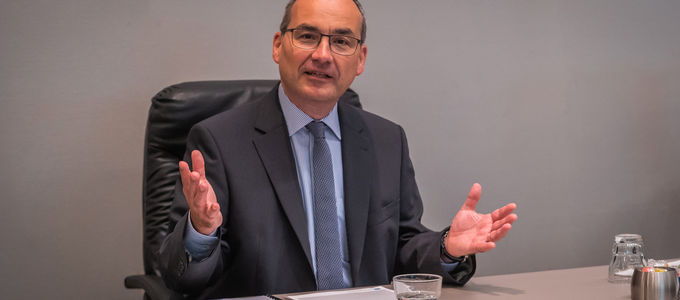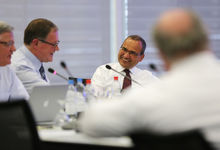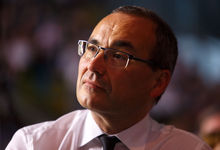Contributing to a collective solution
The challenges are clear, the objectives are defined. What are the means needed to achieve these? And what are the differences between today and the past? The last part of the interview with the Chief Apostle gives an overview of how the Church is setting itself up for the future.

The Church is faced with many challenges and big tasks. Will it be able to manage this financially?
We are currently doing a thorough study of our global finances. We are determined to optimise our operation in order to reduce costs. And where possible, we will pool administrative services.
In the same vein, we have adjusted our church building policy. In Africa, for example, we have stopped building big churches because future generations will hardly be in a position to raise the money to pay the maintenance costs. In other regions we have adapted the number of church buildings and congregations to our current needs. After all, construction and maintenance are becoming more and more expensive everywhere.
The European and North American District Churches are the donor churches. They support most of the congregations around the world. How will this develop?
Very well, I hope. In contrast to past practice, we would rather structure our subsidies to financially dependent District Churches on a project-related basis. The financially strong donor churches will thus finance clearly defined projects rather than subsidising dependent District Churches as a whole.
Even if financial autonomy is not foreseeable in a number of countries in the medium term, we must continue with our endeavours to bring expenditures at the local level into line with the income.
The New Apostolic Church is also a “church of ministry”. Ministry plays a vital role in it. Are there any fundamental strategic considerations for a continuing development also in this respect?
Yes, the Apostles are currently reflecting upon a new way to organise the ministerial hierarchy in the Church. Our goals are
- to define our understanding of ministry on the basis of biblical record, without allowing ourselves to get carried away with interpretations that have more to do with tradition than actual exegesis.
- to clearly distinguish between organisational responsibilities and the exercise of ministerial authority conferred by God through ordination.
- to enhance the competence of the believers irrespective of ministry.
- to adapt our structure to the current needs, by making it more efficient, more comprehensible, and more flexible.
- to introduce instruction and training in general.
- and—generally speaking—to put emphasis on the notion of serving.
The close reference to the gospel is part of your spiritual authority as Church leader. But as Chief Apostle, you are also the highest representative of your Church. Where do you see your tasks?
One of the tasks of the Chief Apostle is to lay down the order within the Church and consequently adapt the structure and organisation of the Church to the present needs.
Do you have any concrete ideas?
In today’s world it is no longer conceivable for a global church such as ours to be led by a single man. Rather, decisions must be made in a collaborative fashion. Like my predecessors, I feel it is important to shape the District Apostle Meeting into a true governing body of the Church. Every member of this board must be able to express himself freely and contribute to collective solutions. We have already made progress in this area, and I am very pleased.
That still sounds a little bit iffy.
Shared leadership also requires certain rules, including the number of District Apostles. You cannot lead the Church with a board of fifty District Apostles. If the District Apostles are to be fully involved in the governance of the Church, their number cannot be too large. That is why we have started to reduce the number of District Apostles in Europe, for example. In addition, we have established the Coordination Group and the Finance Committee. These consist of several District Apostles who act on behalf of the District Apostle Meeting and support the Chief Apostle in his work.
Does shared leadership only apply at the international level?
There are similar approaches at the level of the District Churches. Over the last few years, the role and the decision-making power of the governing bodies (boards of directors, national assemblies, etc.) have been clearly defined and, where necessary, reinforced. Some congregations have even established congregational councils and committees in order to involve the members in organising the activities in the congregation. We will likely see more such solutions in future.
Many questions, and even more answers. Nevertheless, some questions remain. Of course, we are talking about the future. nac.today will summarise the statements this coming Saturday and identify the focus.
Photo: Alex Ferguson
Article info
Author:
Date:
Keywords:
Peter Johanning,
Andreas Rother
23.06.2018
ministry,
Chief Apostle,
Structure,
International,
Institution








